MAJESKI’S MAJESTIC MARSCHALLIN
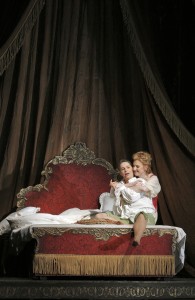 Lyric Opera’s new production of Der Rosenkavalier is beautiful, charming, and magnificent. It delightfully exceeded my expectations and gave me a new appreciation for the operas of Richard Strauss. I’m not quite sure what I expected, but I’ll admit to being apprehensive. Four-hour operas in German are, well, long, especially on a Monday night following the Super Bowl.
Lyric Opera’s new production of Der Rosenkavalier is beautiful, charming, and magnificent. It delightfully exceeded my expectations and gave me a new appreciation for the operas of Richard Strauss. I’m not quite sure what I expected, but I’ll admit to being apprehensive. Four-hour operas in German are, well, long, especially on a Monday night following the Super Bowl.
A romantic comedy set in eighteenth-century Vienna, Der Rosenkavalier focuses on a love triangle (or is it potentially a square?). It starts with Octavian, variously referred to as Quinquin and Baron Rofrano, a seventeen-year old boy in love with an older woman, the Marschallin, Princess Marie Therese von Werdenberg. The plot begins to get interesting with the arrival of Baron Ochs, the Marschallin’s lecherous cousin, a boorish man seeking to marry the nouveau riche Sophie von Faninal. When Octavian is enlisted to help forward the baron’s suit, the young man falls in love with Sophie and seeks to win her for himself.
There’s something very feminine about this opera and production. First, there is Strauss’s score, which seems to aim more for tenderness and delicacy rather than power or glory. It helps that three of the four leads are written for sopranos (the boy Octavian is mezzo-soprano). Then there is the refined neoclassicism of Thierry Bosquet’s period set and costume design with its soft earth tones and pastels. (His only misstep is the priest’s nineteenth-century attire.) Sarah Hatten’s wigs for both sexes add to the allure.
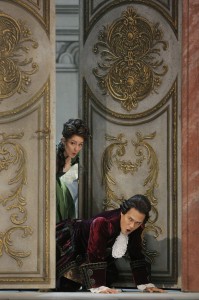 Director Martina Weber brings to the production a natural feel for movement and pageantry together with a keen eye for detail matched to the music. Everything and everyone moves seamlessly, including the occasionally large crowds of singers and actors that fill the stage in each of the three acts.
Director Martina Weber brings to the production a natural feel for movement and pageantry together with a keen eye for detail matched to the music. Everything and everyone moves seamlessly, including the occasionally large crowds of singers and actors that fill the stage in each of the three acts.
Amanda Majeski, seen earlier this season as Countess Almaviva in The Marriage of Figaro, regally embodies the Marschallin. Her tall, slender figure and fair skin are a natural fit for the role, but it is her exquisite tone and vocal technique that makes the performance so absolutely enchanting. Sophie Koch (to be followed later in the run by Alice Coote) brings dashing versatility and spry confidence to the challenging role of Octavian. For not only does she play a boy, she plays a boy pretending to be a girl. When she and Majeski are joined onstage by Christina Landshamer’s Sophie for Der Rosenkavalier’s finale, the resulting trio is heavenly and sublime.
British bass Matthew Rose makes his Lyric debut as Baron Ochs (intentionally sounds like “ox”); his tall stature and sturdy physique are ideally suited to the part. Rose easily carries his character’s comedic aspect without overdoing it, while singing some impressively low notes in a clear tone that never becomes muddy.
It’s easy to see why Richard Strauss’s collaboration with librettist Hugo von Hoffmansthal was so successful. Der Rosenkavalier balances comedy and romance with poetry and elegance. It is on the lengthy side, but with judicious cuts, a superb cast, and a skillful director, the show moves merrily along to its happy conclusion. Lyric couldn’t have done it better.
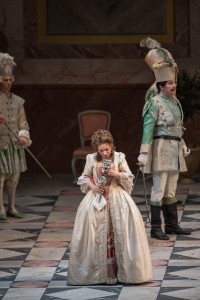 photos by Cory Weaver and Andrew Cioffi
photos by Cory Weaver and Andrew Cioffi
Der Rosenkavalier
Lyric Opera of Chicago
Civic Opera House
20 N. Wacker Drive
ends on March 13, 2016
for tickets, call 312.827.5600 or visit Lyric Opera
for more Chicago Theater, visit Theatre in Chicago
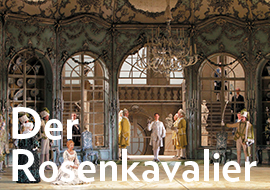
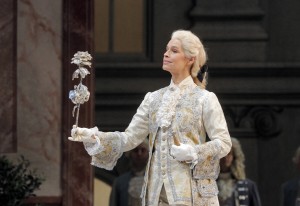
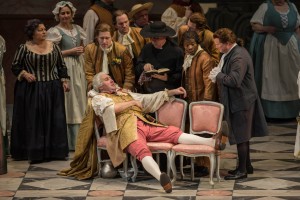
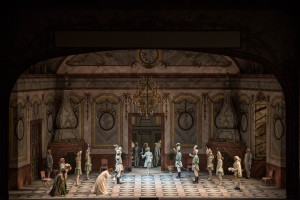
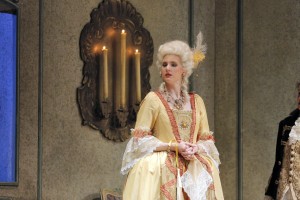
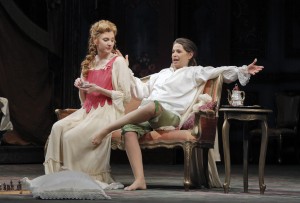

{ 1 comment… read it below or add one }
This is something of a non-review. Your review is the type that awaits us all too many times; information about the opera which anyone can find today anywhere on the internet, to be followed by perfunctory accounts of the singing and the orchestral playing. Please offer something the readers can use to understand how the singing progressed. I was at that performance myself, and Ms. Majeski did indeed sing a superb Marschallin; hers is a voice that is even throughout all three registers and which carried effortlessly throughout the vast spaces of the Civic Opera House. The text of some of the most famous lines in opera, i.e., “die Zeit, die is ein sonderbar ding,” and the wistful, “ja, ja,” at the end of the opera, were delivered with consummate knowing. She is a young lady with the knowledge of someone twice her age. Somewhat nervous in her regal role, Ms. Majeski, I am sure, will learn to move like a Princess as she matures with the role. I wish her years of success. I also noticed no mention of the ease with which Mr. Rose took his Deep C and E.
I wish you continued success at Stage and Cinema.